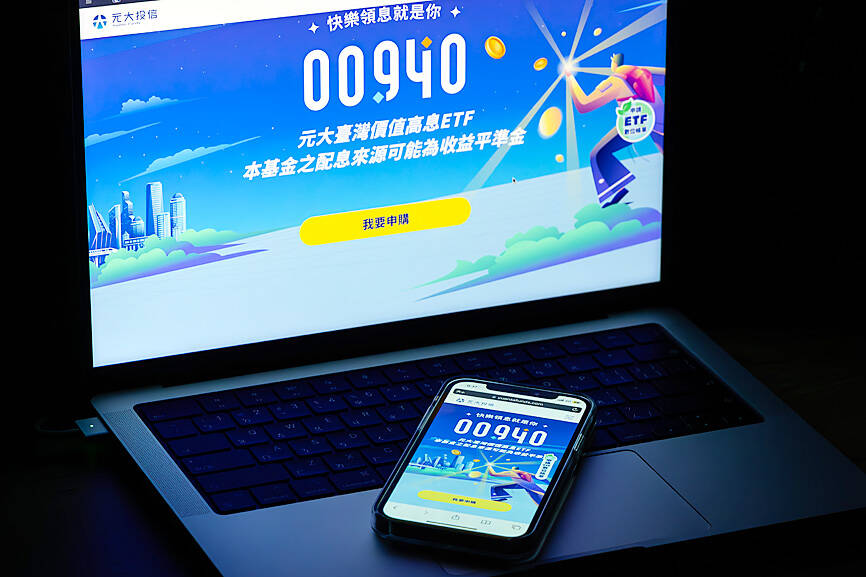A record rally in Taiwanese stocks is luring retail investors to pile into exchange-traded funds (ETFs), as local regulators stepped up warnings on the herding behavior.
Two new stock ETFs this month raised a combined NT$223.1 billion (US$7.05 billion), with the latest one which ended subscriptions on Friday last week setting a new record.
This brings the total inflows into equity ETFs to about NT$340 billion, more than half of last year’s, underscoring how the global market frenzy around artificial intelligence (AI) is spurring local demand for exposure to a technology-heavy market.

Photo: CNA
Central bank Governor Yang Chin-long (楊金龍) last week described the enthusiasm for ETFs as a “herding effect” in the market.
“Everyone is buying like a swarm of bees,” Yang said at a meeting of the legislature’s Finance Committee on Thursday, answering lawmakers’ questions about the surging popularity in ETFs tracking Taiwanese stocks. “It is becoming something of a bandwagon, just like sheep jumping in one after another,” he said.
He added that such funds helped drive up risk in the stock market, which could lead to greater volatility in the long term. That is set to be a challenging job, as local stocks are powered by a record rally in Taiwan Semiconductor Manufacturing Co (台積電), which supplies the majority of the advanced chips used for AI.
A financial expert warned that the rallies or falls in ETFs’ constituent stocks could affect their movements and investment returns.
“When the ETF goes on the market, if there are fluctuations and corrections, some subscribers may jump ship, as many of them likely do not have any experience in stocks or they are more conservative with their finances. Such a reaction could lead to turbulence that only grows faster and more violent,” financial expert Chen Wei-liang (陳威良) told Formosa TV on Friday.
Yuanta Taiwan Value High Dividend ETF has raised NT$170 billion, breaking a record set by UPAMC Taiwan High Dividend Momentum ETF earlier in the month at NT$53.1 billion, Securities and Futures Bureau Deputy Director Kao Ching-ping (高晶萍) said yesterday.
“The future outlook of the constituent stocks should be taken into account in purchasing any ETFs, and past performance does not equate to future performance,” Financial Supervisory Commission Chairman Thomas Huang (黃天牧) said at a briefing yesterday, adding that ETF issuance would be the focus of regulatory checks.
The commission is considering control measures, including introducing caps on how much can be raised by a single ETF, local media reported earlier.

CHIP RACE: Three years of overbroad export controls drove foreign competitors to pursue their own AI chips, and ‘cost US taxpayers billions of dollars,’ Nvidia said China has figured out the US strategy for allowing it to buy Nvidia Corp’s H200s and is rejecting the artificial intelligence (AI) chip in favor of domestically developed semiconductors, White House AI adviser David Sacks said, citing news reports. US President Donald Trump on Monday said that he would allow shipments of Nvidia’s H200 chips to China, part of an administration effort backed by Sacks to challenge Chinese tech champions such as Huawei Technologies Co (華為) by bringing US competition to their home market. On Friday, Sacks signaled that he was uncertain about whether that approach would work. “They’re rejecting our chips,” Sacks

NATIONAL SECURITY: Intel’s testing of ACM tools despite US government control ‘highlights egregious gaps in US technology protection policies,’ a former official said Chipmaker Intel Corp has tested chipmaking tools this year from a toolmaker with deep roots in China and two overseas units that were targeted by US sanctions, according to two sources with direct knowledge of the matter. Intel, which fended off calls for its CEO’s resignation from US President Donald Trump in August over his alleged ties to China, got the tools from ACM Research Inc, a Fremont, California-based producer of chipmaking equipment. Two of ACM’s units, based in Shanghai and South Korea, were among a number of firms barred last year from receiving US technology over claims they have

BARRIERS: Gudeng’s chairman said it was unlikely that the US could replicate Taiwan’s science parks in Arizona, given its strict immigration policies and cultural differences Gudeng Precision Industrial Co (家登), which supplies wafer pods to the world’s major semiconductor firms, yesterday said it is in no rush to set up production in the US due to high costs. The company supplies its customers through a warehouse in Arizona jointly operated by TSS Holdings Ltd (德鑫控股), a joint holding of Gudeng and 17 Taiwanese firms in the semiconductor supply chain, including specialty plastic compounds producer Nytex Composites Co (耐特) and automated material handling system supplier Symtek Automation Asia Co (迅得). While the company has long been exploring the feasibility of setting up production in the US to address

OPTION: Uber said it could provide higher pay for batch trips, if incentives for batching is not removed entirely, as the latter would force it to pass on the costs to consumers Uber Technologies Inc yesterday warned that proposed restrictions on batching orders and minimum wages could prompt a NT$20 delivery fee increase in Taiwan, as lower efficiency would drive up costs. Uber CEO Dara Khosrowshahi made the remarks yesterday during his visit to Taiwan. He is on a multileg trip to the region, which includes stops in South Korea and Japan. His visit coincided the release last month of the Ministry of Labor’s draft bill on the delivery sector, which aims to safeguard delivery workers’ rights and improve their welfare. The ministry set the minimum pay for local food delivery drivers at